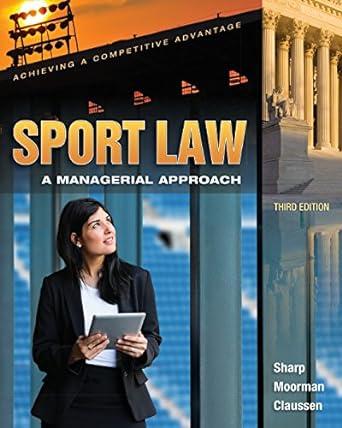The World League of American Football (WLAF) operated in 1991 and 1992 as a professional football league
Question:
The World League of American Football (WLAF) operated in 1991 and 1992 as a professional football league with teams in 10 cities in the United States, Canada, and Europe. In May 1990, Jerome Vainisi, vice president in charge of football operations, contacted various people in order to compile a list of potential applicants for coaching positions. The final list contained the names of 547 potential applicants. The WLAF had a goal of hiring two Black head coaches and two Black general managers for its 10 teams.
Plaintiff James Jackson III, an African American, applied for a coaching position. He had been the head coach of a minor league football team in Connecticut from 1979 to 1988, where he compiled a win-loss record of 74-244 and won three minor league “Super Bowl” championships. Before that, Jackson had been head coach for a semipro football team in New York and an assistant head coach for a high school football team. Despite his coaching experience, Jackson was not invited to an interview, nor was he hired by any of the WLAF teams, and Vainisi testified that he believed Jackson was not qualified for those positions. Although Vainisi testified that he tried to recruit Black coaches and that offers were made to several Black coaches, all of the head coaches he hired were White. There was also some evidence that WLAF may have made offers to Black coaches who were not likely to accept them because they already had jobs in the NFL, which provided them with better job security and compensation, or because they had geographic location preferences.
During the lawsuit, Vainisi testified that “primarily at least being a head coach in college and maybe a coordinator at a professional level would be the minimum” required experience. Vainisi admitted that the hiring criteria were not written anywhere.
Moreover, he indicated that he might credit some minor league coaching experience as professional coaching experience, “depending upon the coach himself and what his prior experience was.” Furthermore, although some of the successful candidates had experience coaching in the NFL or major college programs, at least one, Roman Gabriel, had no such experience. Although Gabriel had been an offensive coordinator for a United States Football League team, Vainisi testified in his deposition that he approved Gabriel to coach the Raleigh-Durham franchise despite reservations about Gabriel’s qualifications. Vainisi’s approval was based largely on Gabriel’s experience as a player in the NFL and the “special business consideration” that “Gabriel is a legend” in the Raleigh-Durham area and “there was almost no other person you could name as the head coach’ down there, because of Gabriel’s reputation in the community.” ia Finally, the plaintiff's personal notes of a telephone conversation with Vainisi indicate that Vainisi told the plaintiff, “we couldn’t name you to Germany because they don’t want a black man as head coach there... . They’re not ready for a black head coach.” There is no evidence that Vainisi informed the plaintiff during that conversation that the plaintiff was not hired because he was not qualified.
Question
1. On what grounds can the plaintiff successfully establish a prima facie case of race discrimination in hiring?
2. How would the defendant argue in favor of some legitimate nondiscriminatory reason for not hiring Jackson?
3. How would the plaintiff make the argument that the WLAF’s defense is pretext for discrimination?
4, In your estimation, who should win this case?
Step by Step Answer:

Sport Law A Managerial Approach
ISBN: 9781621590033
3rd Edition
Authors: Linda A Sharp, Anita M Moorman, Cathryn L Claussen





